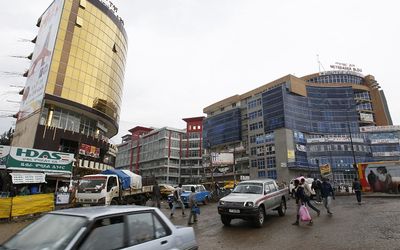Ethiopia quietly dispels Africa myths
by Nimrod Zalk,
2016-01-27 06:26:48.0
FOR many — in the West and SA — Ethiopia evokes images of all that is wrong with Africa: a hopelessly poor, backward and famine-prone country. But a book by Arkebe Oqubay, Made in Africa, dispels these myths and describes the quiet revolution that has been under way since the early 1990s — roughly the period since SA’s democratic transition.
After the 1991 ouster of the Soviet-backed Derg dictatorship, which had introduced a disastrous programme of control over virtually every sector of the economy, Ethiopia’s new government established a broadly market-based economy.
Like SA, it initially adopted an orthodox policy mix based on macroeconomic stabilisation and market liberalisation. However, it quickly concluded these policies were not up to the task of rapidly raising the living standards of a population of 80-million in a country without significant mineral resources.
From 1998, it went on a series of increasingly ambitious programmes of agricultural modernisation, public infrastructure development and private sector industrialisation driven by an activist state.
The current policy thrust promotes the rapid growth of light manufacturing and "industrial" agriculture. Policies have been successfully implemented to channel scarce public resources, largely through state-owned enterprises, into water, electricity, telecommunications, cement and rail infrastructure.
Ethiopia is constructing an ambitious large-scale dam on the Nile. A high-speed rail link with the neighbouring port of Djibouti is in its final stages. Rapidly built industrial parks are being leveraged, in conjunction with other support measures, to attract foreign and domestic investment into light manufacturing.
The results have been impressive. In less than a decade, Ethiopia has emerged as one of the largest floriculture exporters in the world.
Recognising that rising wages and an appreciating currency in China represent an opportunity to enter the global clothing market, Ethiopia has attracted substantial investment, creating tens of thousands of jobs in the process.
Between 2003 and 2013, average annual growth has been 11%. Per capita income, albeit off a low base, was four times higher in 2013 than in it was in 1991 (rising from $120 to $558 per capita). Poverty has been halved in two decades and life expectancy increased from 48 in 1992 to 63 in 2012. According to the World Bank, if Ethiopia sustains this level of growth, it will have shifted from being the second poorest country in the world to a middle-income country by 2025.
To be sure, the Ethiopian experience should not be romanticised, nor are its specific conditions or policies directly transportable.
There are formidable challenges in moving from "easy" agricultural and light manufacturing sectors to higher value manufacturing and related services. In the process, Ethiopia must navigate a continued political transition including greater participatory democracy and tackling its often criticised human rights record.
However, the Ethiopian experience does have relevance for other African countries including SA. It demonstrates that high growth and development economies are not the sole preserve of some distant and unattainable "east Asian miracle".
It is rapidly dispelling the myth that Africa cannot, and for some commentators should not, industrialise. A deeper analysis of Ethiopia’s political economy may also provide useful lessons about the state’s role, including its success in guiding public and private investment into productive sectors with strong linkages and multipliers, and discouraging undesirable or downright destructive economic behaviour.
This includes unproductive rent-seeking through the state, private sector activities with low or even negative economic spillovers, and areas where the two coincide.
• Zalk is an industrial development policy and strategy adviser in the Department of Trade and Industry. He writes in his personal capacity

People walk through the streets of a shopping area in Addis Ababa, Ethiopia. Picture: REUTERS
FOR many — in the West and SA — Ethiopia evokes images of all that is wrong with Africa: a hopelessly poor, backward and famine-prone country. But a book by Arkebe Oqubay, Made in Africa, dispels these myths and describes the quiet revolution that has been under way since the early 1990s — roughly the period since SA’s democratic transition.
After the 1991 ouster of the Soviet-backed Derg dictatorship, which had introduced a disastrous programme of control over virtually every sector of the economy, Ethiopia’s new government established a broadly market-based economy.
Like SA, it initially adopted an orthodox policy mix based on macroeconomic stabilisation and market liberalisation. However, it quickly concluded these policies were not up to the task of rapidly raising the living standards of a population of 80-million in a country without significant mineral resources.
From 1998, it went on a series of increasingly ambitious programmes of agricultural modernisation, public infrastructure development and private sector industrialisation driven by an activist state.
The current policy thrust promotes the rapid growth of light manufacturing and "industrial" agriculture. Policies have been successfully implemented to channel scarce public resources, largely through state-owned enterprises, into water, electricity, telecommunications, cement and rail infrastructure.
Ethiopia is constructing an ambitious large-scale dam on the Nile. A high-speed rail link with the neighbouring port of Djibouti is in its final stages. Rapidly built industrial parks are being leveraged, in conjunction with other support measures, to attract foreign and domestic investment into light manufacturing.
The results have been impressive. In less than a decade, Ethiopia has emerged as one of the largest floriculture exporters in the world.
Recognising that rising wages and an appreciating currency in China represent an opportunity to enter the global clothing market, Ethiopia has attracted substantial investment, creating tens of thousands of jobs in the process.
Between 2003 and 2013, average annual growth has been 11%. Per capita income, albeit off a low base, was four times higher in 2013 than in it was in 1991 (rising from $120 to $558 per capita). Poverty has been halved in two decades and life expectancy increased from 48 in 1992 to 63 in 2012. According to the World Bank, if Ethiopia sustains this level of growth, it will have shifted from being the second poorest country in the world to a middle-income country by 2025.
To be sure, the Ethiopian experience should not be romanticised, nor are its specific conditions or policies directly transportable.
There are formidable challenges in moving from "easy" agricultural and light manufacturing sectors to higher value manufacturing and related services. In the process, Ethiopia must navigate a continued political transition including greater participatory democracy and tackling its often criticised human rights record.
However, the Ethiopian experience does have relevance for other African countries including SA. It demonstrates that high growth and development economies are not the sole preserve of some distant and unattainable "east Asian miracle".
It is rapidly dispelling the myth that Africa cannot, and for some commentators should not, industrialise. A deeper analysis of Ethiopia’s political economy may also provide useful lessons about the state’s role, including its success in guiding public and private investment into productive sectors with strong linkages and multipliers, and discouraging undesirable or downright destructive economic behaviour.
This includes unproductive rent-seeking through the state, private sector activities with low or even negative economic spillovers, and areas where the two coincide.
• Zalk is an industrial development policy and strategy adviser in the Department of Trade and Industry. He writes in his personal capacity



























Change: -0.03%
Change: -0.13%
Change: -0.96%
Change: 0.02%
Change: 0.61%
Data supplied by Profile Data
Change: 0.02%
Change: -0.74%
Change: -0.03%
Change: 0.00%
Change: -0.81%
Data supplied by Profile Data
Change: 0.07%
Change: 0.13%
Change: 0.12%
Change: 0.36%
Change: -0.11%
Data supplied by Profile Data
Change: 0.77%
Change: 0.43%
Change: 0.34%
Change: 1.22%
Change: 0.97%
Data supplied by Profile Data